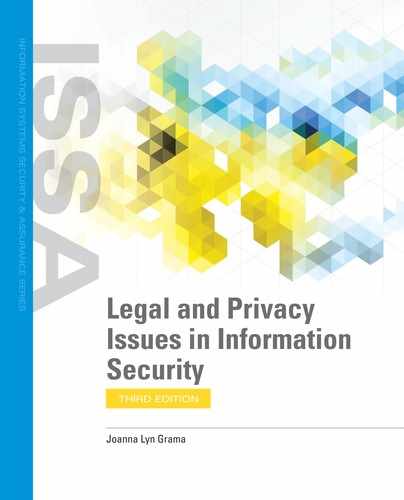Case Studies and Examples
The following case studies and examples show how the concepts discussed in this chapter are used. These case studies are real-world examples of criminal and tort law issues in cyberspace.
CAN-SPAM Act
The U.S. government first brought criminal charges under the CAN-SPAM Act in April 2004. The U.S. Postal Inspection Service, U.S. Attorneys’ office, and FTC were involved in investigating the case.
In this case, the federal government charged the defendants with sending spam messages to sell phony diet products. The defendants operated under the name Phoenix Avatar, LLC. The defendants hid their identities in spam messages by using corporate and government computer systems and spoofing third-party email addresses. They used computers belonging to Ford Motor Company, computers used by the U.S. court system, and the Unisys Corporation to hide their identities. Undeliverable spam bounced back to the innocent third-party email addresses. Phoenix Avatar sent millions of spam messages this way.
One of the defendants in the case, Daniel Lin, pleaded guilty to violations of the CAN-SPAM Act in January 2006. In June 2006, the court sentenced him to 3 years in federal prison.
![]() NOTE
NOTE
You can read the FTC enforcement action documents for the Phoenix Avatar case at https://www.ftc.gov/enforcement/cases-proceedings/042-3084/phoenix-avatar-llc-dba-avatar-nutrition-djl-llc-et-al.
The FTC filed a civil enforcement action against Phoenix Avatar. The FTC brought the action for violations of both the FTC Act and the CAN-SPAM Act. The FTC Act violations were related to the defendant’s sale of the phony diet products.
In March 2005, the FTC settled civil charges against Phoenix Avatar. As part of the settlement, the defendants agreed to pay a $20,000 penalty. They also agreed not to violate the CAN-SPAM Act in the future.
Defamation on College Campuses
The internet has many anonymous gossip websites. Juicy Campus, one of the first popular sites, started in 2007 and closed down in February 2009. It allowed college students to post anonymous gossip about events and people at their campuses. Juicy Campus had separate web pages for different colleges.
Juicy Campus billed itself as a way to promote free speech on college campuses. Among its features, anonymous users could post gossip about other students, read gossip posted by other users, and vote on the “juiciest” pieces of gossip. Students ridiculed or insulted on Juicy Campus had little recourse, as the postings were anonymous. As an ISP, Juicy Campus did not share the identities of its online posters without a court order.
Since Juicy Campus closed down, other online campus gossip websites have grown in popularity. One of the sites that opened when Juicy Campus shut down was College ACB. In a press release, the owner of the website wrote: “The College ACB or College Anonymous Confession Board seeks to give students a place to vent, rant, and talk to college peers in an environment free from social constraints and about subjects that might otherwise be taboo.” College ACB closed down in 2011.65
AutoAdmit, a similar site, is an online law school discussion board. As on similar gossip websites, posts in that forum sometimes can be insulting and offensive. In 2007, two Yale Law School students sued anonymous AutoAdmit posters for defamation. The parties settled the case in 2009. The terms of the settlement were confidential. You can learn more about that case on the Citizen Media Law project web page at http://www.citmedialaw.org/threats/autoadmit#description.
Think about websites and apps that create experiences where you can hang out in chat rooms with nearby people. Some allow people to post anonymously. Some do not. How do they promote free speech? Are there occasions on these apps and websites where one person’s right to free speech infringes upon another person’s right to live peacefully?
